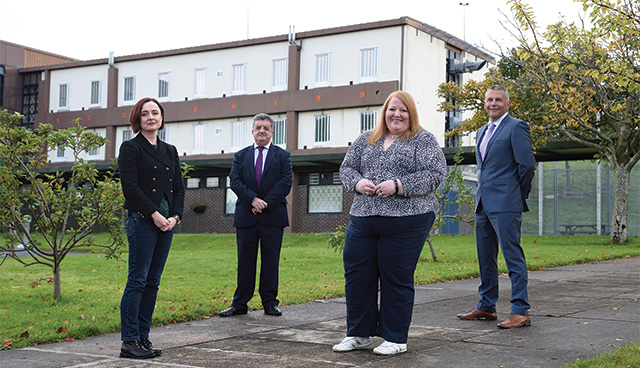Minister Long: Legislating for change

Minister for Justice Naomi Long MLA talks to David Whelan about the Department’s busy legislative programme, the wider justice family’s response to the pandemic and the challenges of budgetary constraints.
Sitting roughly at the halfway point of the shortened Northern Ireland Assembly and Executive mandate, the Department of Justice is engaged in one of the most, if not the most, busy legislative programmes of any department in recent years.
Progress has been driven not only by the ambitions set out in the New Decade, New Approach agreement but also by Minister Long’s personal priority of a victims-focused approach.
However, as Long admits, progress has not been without challenge, particularly the pandemic, the impact of which has stretched to all aspects of the justice system.
Few could have known that at the beginning of 2020, when issuing a commitment to deliver committal reform “to help speed up the criminal justice system”, that a global pandemic would see the temporary closure of courts, a reconfiguration of the prison system and new ways of working for the Northern Ireland Executive, its departments, the Assembly and its associated committees.
Despite these unique challenges, Long assesses “significant progress” in ambitions to speed up justice. Pointing to the courts as an example of progress delivery, the Minister highlights that following an initial period of closure, not only have Crown courts resumed operations but more Magistrates courts are now operating in Northern Ireland than was the case pre-Covid.
“We’ve been able to put in the physical measures to ensure that this can continue and we’re now starting to make inroads into the backlog that was created, something we will continue to work on,” the Minister says.
Showcasing an agile approach, Long points to the securing of additional space for the Northern Ireland Courts and Tribunals Service (NICTS), the most recent example of which was the move by the Executive to amend the Health Protection (Coronavirus, Restrictions) (No 2) Regulations (Northern Ireland) 2020, to enable the NICTS to use external conference facilities in Northern Ireland as ‘Nightingale’ venues, including Belfast’s International Convention Centre (ICC).
The Minister says that a move forward on tribunals, additional space for jury empanelment and an ambition to take forward inquest work, are all positive steps.
A legislative Assembly
Another major step towards committal reform is the Criminal Justice (Committal Reform) Bill, introduced to the Assembly by the Minister in November 2020 and entering committee stage. Long explains that she hopes the Bill will make a significant difference to how cases progressing through the Crown court are handled and explains that the Bill also goes some way to addressing some of the recommendations which emerged from the Gillen Review Report into the law and procedures in serious sexual offences in Northern Ireland in relation to the speed of justice.
The Criminal Justice (Committal Reform) Bill is one of five pieces of primary legislation which the Minister hopes to legislate for through the Assembly by the end of the current mandate in March 2020. The Domestic Abuse and Civil Proceedings Bill has already passed all the necessary Assembly hurdles and was given royal assent on 1 March and the Protection from Stalking Bill was introduced on 18 January 2021. As well as those already introduced, Long has brought forward a Damages (Return on Investment) Bill, and is aiming for a Justice (Miscellaneous Provisions) Bill in spring 2021, which the Minister outlines will largely relate to victims and witnesses of serious sexual offences.

“I think it’s important that as a legislative assembly that we put down a marker and follow through on our primary purpose for existing.”
“The legislative programme is only one part of the work we have been doing but it’s a demanding programme, especially for a shortened mandate. We had a three-year lag and that’s something I’m very conscious of because we had things that needed to be done as a matter of urgency. We also had changed laws in other parts of these islands which we had to keep pace with,” says Long.
“I think it’s important that as a legislative assembly we put down a marker and follow through on our primary purpose for existing.”
Questioned on whether enough time was left of the mandate for all five bills, the Minister says that the “right attitude and right commitment” can see this achieved. One Bill which has not made it on to the Department’s legislative programme, however, is that in relation to the recommendations from the independent hate crime legislation review, the final report of which was published in December 2020.
Hate crime
If adopted, the recommendations would see Northern Ireland move from a laggard in terms of hate crime legislation to holding the most progressive laws across the UK. Asked if the absence of hate crime legislation was due to capacity constraints, the Minister says that time is also a critical factor.
“The budget is a challenge and all of us recognise that we are constantly being asked to do more with less.”
“In order to bring legislation to the Assembly there is a series of stages, such as policy development and consultation with other parts of the justice system, which need to be reached even before public consultation and the drafting of a Bill. The policy development period will take us in to the end of the year and that would mean little chance of that legislation making it on to the books in this mandate. I don’t believe there is any point in us making poor law in order to tick a box,” she states.
Long sets out an unwillingness to place such a “hefty” piece of legislation through under the (Miscellaneous Provisions) Bill, preferring instead to give the Assembly’s Justice Committee proper opportunity for scrutiny.
Setting out that this does not mean that progress on hate crime legislation will stop, she adds. “I think there are issues within the review of the legislation that can be taken forward in short order rather than by full-blown primary legislation, including recommendations around how we work across the justice sector and improving our response to hate crime in the here and now.”
Long’s vision is for those existing legislative improvements to be brought forward as part of a Bill which can be prepared and ready to go early in the next mandate. “In the department, we’re not viewing this as a last opportunity to legislate. Mandate continuity is key, and I think we need to try and build confidence in the structures to say that ‘we (the Executive and the Assembly) will be here post-election, doing legislation and that we don’t envisage being back in the situation we found ourselves in in 2017’. If we can get that message through and work as an Executive to communicate that then we are much more likely to get a manageable legislative programme for the next mandate.”
Budget
Undoubtedly, one of the greatest challenges facing the Department, and all public services across Northern Ireland is budgetary allocation. The New Decade, New Approach pledge to deliver a multi-year budget has not been fulfilled and Finance Minister Conor Murphy MLA recently described Northern Ireland’s latest one-year draft budget as a “standstill”. Undoubtedly, this will have implications for another New Decade, New Approach pledge to increase police numbers to 7,500. PSNI Chief Constable Simon Byrne recently said that rather than enabling the increase of numbers, the real time £23 million shortfall in the policing budget allocation could see a reduction of officers and staff.
“The budget is a challenge and all of us recognise that we are constantly being asked to do more with less,” says the Minister, adding: “My department is working hard to ensure that we are living within our means but we’re conscious that we’re a largely people-focused department and therefore it’s difficult for us to make cuts that don’t hit frontline services.”
“In the Department, we’re not viewing this as a last opportunity to legislate. Mandate continuity is key, and I think we need to try and build confidence in the structures…”
Policing makes up 70 per cent of the Department’s annual budget and Long maintains that how that money is spent is determined by the Chief Constable. In turn, she suggests that additional police officers are a budgetary decision for Byrne. Questioned on whether the New Decade, New Approach agreement was misleading in this regard, she says: “No, I think the intention is that if the money is there, then we would want to be able to fund that. We didn’t say we would be able to fund that all in one year or all in one mandate. However, in the last year we already have seen additional officers added to the cohort the police have.”
Long accepts that much of the additional funding for more officers came from Brexit contingency funding, a pot which is unlikely to be available again going forward.
“I’ve been working with the Chief Constable and my own officials looking at police numbers and funding for the police and how we might work through those issues. The difficulty of course is that it is recurrent funding and so it needs to be embedded in the Department’s finances. Given that the PSNI is about 70 per cent of our budget, the chances are that if we’re at a standstill, so are the police and there is not likely to be any scope for realignment.”
Progress
The Minister believes that despite the challenges posed by Covid-19, agile responses to the virus’ impact from across the justice system has also presented opportunities to drive forward transformation. Greater digital collaboration across the justice system, for example, has been achieved and will continue into the future. Long believes that the right conversations are being had around greater uses of digital technology, while also constantly assessing the impacts of this on the public’s access to justice and access to victim support and other services.
Outlining recent innovations such as remote court hearings and improved administrative processes, Long says that these serve as an indication that partners in the justice sector, while operating their own independent remit, share an increasing recognition of their inter-dependence and the benefits of enhanced collaboration.
“I think that’s a positive step and it’s one of the reasons we have been able to manage caseloads within the courts during this period in a way that doesn’t place any of the different parts of the system under undue stress but at the same time offers us the opportunity to make inroads into backlogs,” states Long.
The Minister points to the prison system as another example whereby pandemic mitigation measures have been successful and will likely be maintained into the future. Northern Ireland’s prisons have avoided the 23-hour lockdown of prisoners, utilised in some other countries to prevent the virus’ spread. Access to education has been facilitated digitally and over 35,000 virtual visits have now been overseen.
Long acknowledges that physical visits will still be the preference of some prisoners, with the department aiming to have these reinstated as soon as circumstances allow it but says that the benefits and positive feedback from digital visits means that it is something she would like to see retained.
Enforcement
The post-Christmas period saw Northern Ireland experience its worst spike in Covid cases and at the end of January, NISRA recorded the worst single day for Covid-related deaths. In December, police were granted “additional” powers by the Executive to legally enforce its stay at home message, however, some have questioned whether greater levels of enforcement are needed while restrictions remain in place.
The Minister says that anyone who believes that you can “police away” the consequences of a global pandemic “is grasping at straws”. “The reality is that we only get through this if we are all working and making our contribution and doing that consistently.”
Acknowledging the feeling of exhaustion and frustration felt by many in relation to regulations and restrictions felt by the public over the last year, Long says that the PSNI’s use of the four Es (engage, explain, encourage and enforce), with enforcement being the last resort, is the right response.
“As a society we all have responsibility in terms of the regulations and a responsibility for our own behaviours and moderate them for the benefit of the community. The police can’t be expected to take all the strain. They also need to be able to rely on our support.”
“I think the police have generally done a good job. We know there has been a lot of debate around some of their enforcement activities and whether they were proportionate or not, and there will be ongoing discussion about it, but I think we all recognise that they’re working in a very challenging environment.”
The Minister says that it is unrealistic to expect the PSNI to police “every back garden, living room and interaction” but outlines her belief that police engagement and support is much more likely to see the public sustain changes to their lifestyle. However, she adds that enforcement does have a role where people are disregarding other people’s health and says that additional powers have been given to the PSNI when requested.
“As a society we all have responsibility in terms of the regulations and a responsibility for our own behaviours and moderate them for the benefit of the community. The police can’t be expected to take all the strain. They also need to be able to rely on our support,” she adds.
Priorities
Concluding, the Minister says that she plans to maintain her focus on victims of crime, which she outlined upon taking up the post. In August 2020, it was revealed that Long had volunteered her department to take on the administration of a compensation for injured ‘Troubles’ victims, following a court ruling that The Executive Office had acted unlawfully in delaying the introduction of the scheme. It is this scheme that Long points to when asked to identify her greatest ambition for the remaining mandate.
“The scheme wasn’t necessarily a good fit for my department but with its support, I volunteered to take it on. It’s a very challenging timeframe that we’ve set in terms of wanting to get the scheme up and running and ready for accepting applications in early March 2022,” she says.
Given the volume of work required between now and then, Long is well aware that even a slight deviation on timelines could be multiplied greatly in the form of delay but expresses her confidence in reaching the deadline set.
“For me, doing this is crucial. These are victims that have long-standing injustices and real issues around being able to access the supports they need for a decent quality of life. Where I have opportunity to drive forward acknowledgement and support for victims of ‘the Troubles’, I will. The other major element of the scheme is finance and we’re working hard with the Executive, and hopefully the Secretary of State, to find an agreed way forward because I think it would be a shame if the scheme was there and ready to go but we’re not able to deliver,” she adds.
Finally, Long points to a focus over the next number of months on the Tackling Paramilitarism Programme. Describing the deployment of a three-year outlook, managed with an annual budget as “a genuine challenge”, Long welcomes a commitment by the Executive to expenditure on a matched funding-basis for the next three years with the Northern Ireland Office (NIO).
“For me, those areas of trying to improve lives for victims but also trying to impact on the quality of life right across our communities in terms or paramilitarism are those that when I came into the job, I said I wanted to tackle. We’re making good progress and will look to develop those going forward.”





